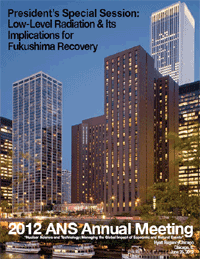Scaremonger Week in the mainstream media
An unusual number of unusually ill-founded nuclear headlines appeared in the mainstream media last week. Among the more prominent:

An unusual number of unusually ill-founded nuclear headlines appeared in the mainstream media last week. Among the more prominent:
 ANS Nuclear Cafe is proud to host the 170th edition of the Carnival of Nuclear Energy - a rotating feature that showcases the best pro-nuclear blogs and authors each week in a single, easy to access compilation. Contributions are volunteered by the authors, with the exception of "Captain's Choice" picks that the Carnival host makes from time to time. With that, let's get to this week's posts!
ANS Nuclear Cafe is proud to host the 170th edition of the Carnival of Nuclear Energy - a rotating feature that showcases the best pro-nuclear blogs and authors each week in a single, easy to access compilation. Contributions are volunteered by the authors, with the exception of "Captain's Choice" picks that the Carnival host makes from time to time. With that, let's get to this week's posts!
This week, the Fukushima Daiichi nuclear station's long history was further appended by the approval of decommissioning plans for the site by Japan's nuclear regulator, the Nuclear Regulation Authority (NRA). This approval both clearly sets guidelines for safety at the site, and puts the government stamp of approval on Tokyo Electric Power Company's highly complicated timeline for the complete decommissioning and removal of Units 1 through 4 at the site. This announcement follows closely the order by Prime Minister Abe to increase government oversight of cleanup efforts on site. What remains to be seen is whether or not the Japanese public has any more faith in their government regarding decommissioning of the site than it has with TEPCO, which by all accounts in the Japanese press is no longer considered trustworthy.
 The 168th Carnival of Nuclear Energy has been posted at The Hiroshima Syndrome. You can click here to see this latest edition of a long-running tradition.
The 168th Carnival of Nuclear Energy has been posted at The Hiroshima Syndrome. You can click here to see this latest edition of a long-running tradition.
Tokyo Electric Power Company (TEPCO) has found itself thrust into the spotlight again over the last two weeks as a series of events at and around the damaged Fukushima Daiichi nuclear station have triggered a large volume of negative press, government commentary, and regulatory backlash. The embattled utility clearly has its hands full on more than one front.
On March 11, 2011, a 9.0 earthquake and 40-foot-high tsunami waves hit Fukushima, Japan. The impact on the Fukushima Daiichi nuclear power plant was a call-to-action for members of the American Nuclear Society.
At about a quarter to three in the afternoon on March 11, 2011, a gigantic and unprecedented earthquake struck just over 110 miles off the coast of Fukushima Prefecture in Japan. The quake was followed, just over 40 minutes later, by the first of several rounds of tsunami, which inundated enormous areas and eradicated entire towns and villages. Over 19,000 people were killed or are still missing, and over 6,000 survivors were injured.
The approach of the second anniversary of the Great East Japan Earthquake of March 2011 finds nuclear energy in Japan at a crossroads. After the quake and resulting tsunami, the nuclear plants in Japan that did not shut down immediately eventually all had to shut down for their required, scheduled outages. Political pressures, for the most part, prevented any near-term chance of any of them restarting, it seemed at the time. When Tomari Unit 3 shut down in May 2012, Japan found itself with not one single operating nuclear power plant for the first time in decades. Since that time, only two nuclear units have restarted-Ohi Units 3 and 4 in July 2012. Other plants, rumored to be "next" to start up, have still not started up, although they may soon. The question that springs to mind is naturally, "When will the majority of the plants be allowed to restart?" The more insightful question, though, is, "What will have to be done in order to allow any plant to restart?" And how can we tell which will start first-is there any clue present now? Yes, there is.
Plus a few pointers to what's in store for 2013
The morning for us here in San Diego was filled with Opening Plenary Session events followed by an Attendee Luncheon in the Nuclear Technology Expo. (During the luncheon I had the good fortune to meet Dillon Inabinett and Kallie Metzger, both Graduate Research Assistants at the University of South Carolina's College of Engineering and Computing.)
Restart of the nation's nuclear reactors will be guided by its actions
Implementation of the energy policy announced last week will keep reactors running well into the second half of the 21st century.
 Both the Republicans and the Democrats have recently released their party platforms. Here's a look at what each platform has to say about energy and environmental issues in general, and on nuclear specifically.
Both the Republicans and the Democrats have recently released their party platforms. Here's a look at what each platform has to say about energy and environmental issues in general, and on nuclear specifically.
At the ANS 2012 Annual Meeting, ANS Public Information Committee's Dan Yurman caught up with Dr. Wade Allison, of Oxford University, UK. They discussed radiation, health effects, Fukushima, Dr. Allison's recent book Radiation and Reason, and Dr. Allison's recent trip to Japan in this video interview.
On Friday, March 11, 2011, one of the largest earthquakes in the recorded history of the world occurred on the east coast of northern Japan. The earthquake generated a major tsunami, causing nearly 20,000 deaths.
 The American Nuclear Society's annual meeting for 2012 included a President's Special Session titled Low-Level Radiation & Its Implications for Fukushima Recovery (Warning-the link leads to a 54 MB, 208 page PDF full of disruptive information that might change your opinion on the benefits of spending billions of dollars every year to keep radiation doses as low as unreasonably achievable).
The American Nuclear Society's annual meeting for 2012 included a President's Special Session titled Low-Level Radiation & Its Implications for Fukushima Recovery (Warning-the link leads to a 54 MB, 208 page PDF full of disruptive information that might change your opinion on the benefits of spending billions of dollars every year to keep radiation doses as low as unreasonably achievable).
Facts vs. myths about the health effects of Fukushima and Chernobyl. The conclusions of scientists studying health consequences may be startling to those exposed only to commonly held beliefs and traditional media (and Chernobyl Diaries!)
The University of California-Berkeley Nuclear Engineering Department has been awarded an American Nuclear Society Presidential Citation, ANS President Eric Loewen announced today. Loewen will present the award to UC-Berkeley nuclear engineering department representatives during the President's Session of the ANS Annual Conference, Nuclear Science and Technology: Managing the Global Impact of Economic and Natural Events, being held June 24-28 in Chicago, Ill.
In recent days, a number of articles have been printed that assert that a grave danger exists at the Fukushima Daiichi nuclear generating station. These articles claim that this danger exists due to the condition of the spent nuclear fuel at the site and the supposedly shaky condition of its storage and care. Two examples:
This evening there will be a debate on a nuclear referendum that is on the town ballot in Plymouth, Mass. The referendum calls for a halt to relicensing the Pilgrim nuclear power plant, pending implementation of Fukushima lessons learned.